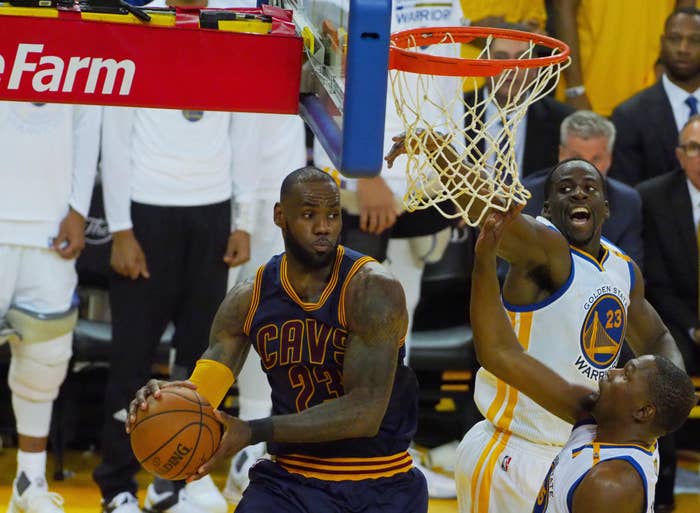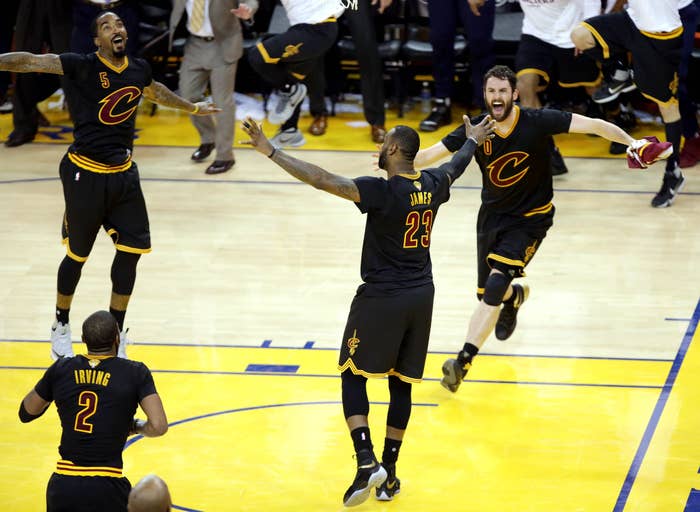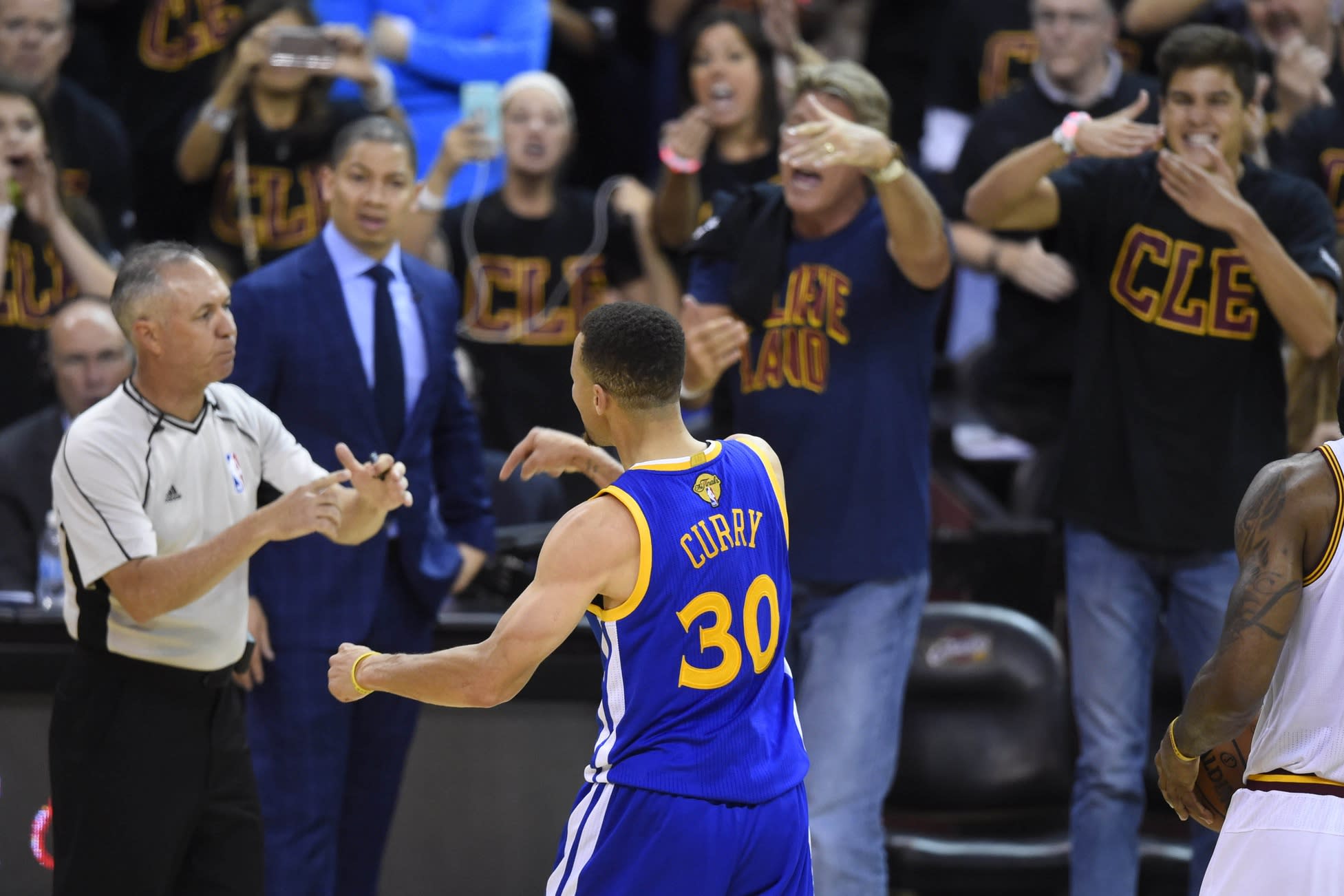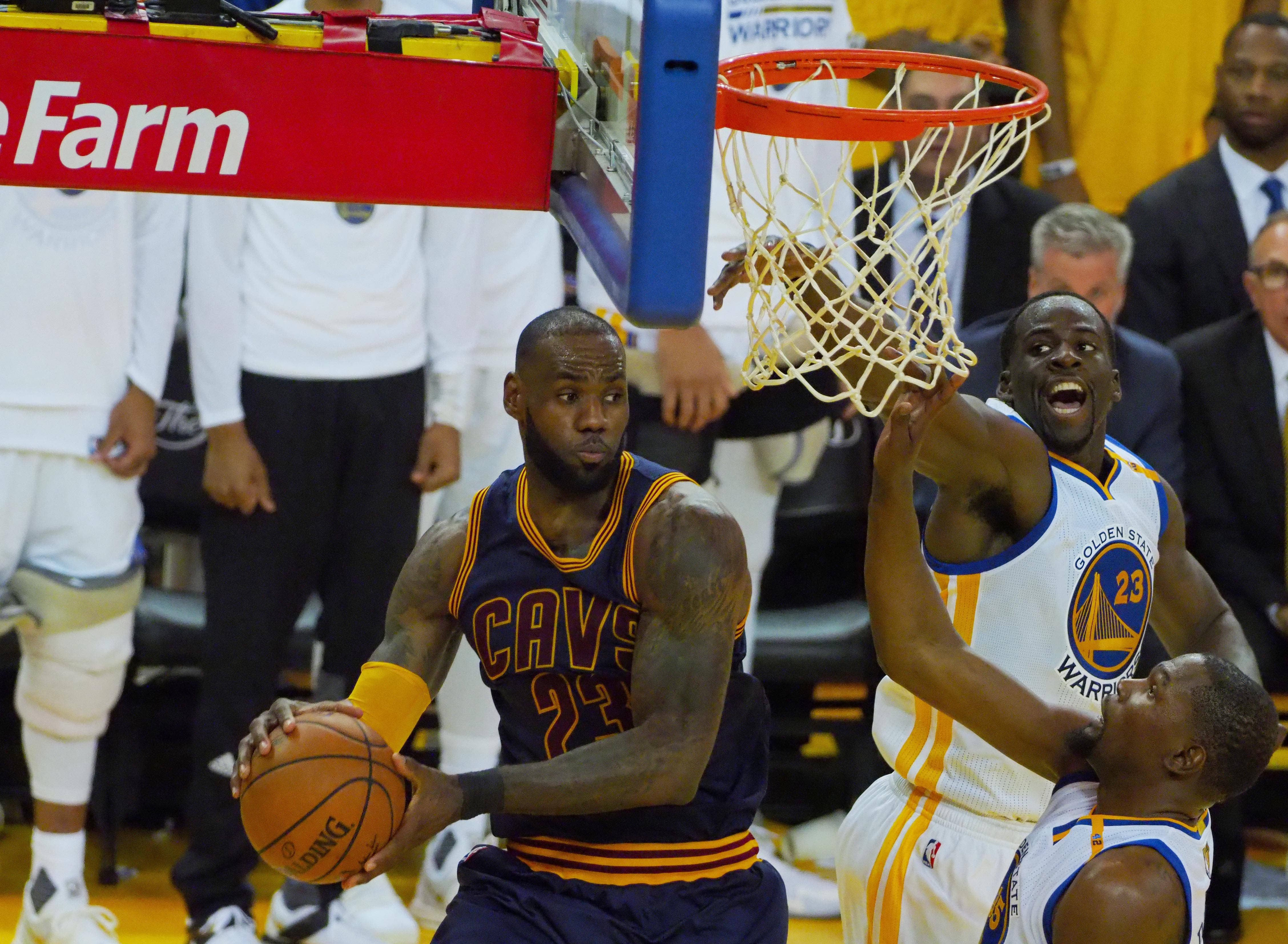
As the stakes get higher, NBA fans become more prone to overreaction. It makes sense—at this time of year, everything is A1.
Competition is whittled down to the best of the best. Coverage is unending. Every possession is analyzed and every player is psychoanalyzed. Crowds are raucous. Rihanna is in the house.
It naturally follows, then, that fans’ opinions rise to the size of the moment and hyperbole becomes the norm. Some folks are already writing the Cavaliers off after the Warriors dominated in Game 1, cruising to a 113-91 win at Oracle Arena Thursday, but as we know, people did the same thing after Golden State went up 3-1 in last year’s Finals, and then this happened…

My pick has not changed, but it’d be foolish for anyone to write the Cavs off at this point. Though it looked effortless for Golden State in Game 1, expect a much closer game Sunday night.
Cleveland turned the ball over 20 times Thursday, leading to 21 points off turnovers. The Cavs were awful on defense, recording zero steals and forcing only four turnovers (tying an NBA Finals record for the fewest turnovers in a game). J.R. Smith and Tristan Thompson were abysmal. Though LeBron James put up 28, 15, and eight, he had eight turnovers and the worst plus-minus (-22) of any player on the court.
The Cavs are too good to play that way again.
The Cavs are good enough, in fact, to claim Game 2 and even this series up before it heads to the Land—but Tyronn Lue and company need to make a strategic change.
For all the planning and analysis that goes into a matchup as big as this one, one might expect it would take a rocket scientist to explain the nuanced strategy Cleveland needs to implement. But, as is often the case in sports, it’s really not that complicated.
The big thing the Cavs need to do is simple: slow the game down, make it a slugfest, and limit Golden State’s number of possessions.
In Game 1, the Cavs played right into Golden State’s hands. They pushed the ball at every opportunity and invited a frenetic pace. As The Ringer’s excellent NBA writer Jonathan Tjarks pointed out, this is the type of possession where Cleveland needs to pull the ball out.
LeBron James is trailing the play, it's a 4-on-5, Kyrie Irving is the only potential offensive rebounder near the rim, and Iman Shumpert is a below-average shooter—what was he thinking?
Cleveland’s head-scratching insistence on pushing the ball, coupled with its sloppiness, led to the Warriors attempting 106 shots. If the Cavs are going to allow Golden State, with its prolific shooters around the perimeter, to hoist triple-digit shots, you can put this series in the books and draw a line through Cleveland.
The Cavs need to replicate the strategy from their improbable Finals run last year. They forcibly slowed the game down, constraining Golden State—which would prefer the run-and-gun, razzle-dazzle style of hoops we saw in Game 1—to play a grueling half-court game.
Here are the Warriors’ shot-attempt totals from the four games Cleveland won in last year’s Finals: 76, 88, 82, and 83. And Golden State’s point totals in those four games? 90, 97, 101, and 89. That’s an average of 94.3 points per game. Taking it back further, in the Cavs’ two wins against Golden State in the 2015 Finals, the Warriors averaged 92 points per game.
There is a golden number here that Cleveland needs to keep in mind: 100 points. When Golden State hits the 100-point mark against Cleveland, the Warriors are practically guaranteed to win.
In the 14 NBA Finals games played between these teams over the past three seasons, Golden State has hit triple digits nine times. They’ve won all but one of those games (a 115-101 loss in Game 6 in 2016—The Mouthguard Game). When the Cavs have kept the Warriors under 100 points, Cleveland is 5-0.

Don’t get it twisted: this strategy is not a guaranteed success. The Warriors have previously beaten the Cavs with as few as 75 shot attempts (Game 6, 2015), the Cavs still have Richard Jefferson and Deron Williams in their rotation, and Golden State has two of the five best players in the NBA—both of whom are on fire right now. But this is Cleveland’s only hope.
This may seem straightforward, but the Cavs are hesitant to embrace slowing it down. Asked about that Saturday, Richard Jefferson scoffed at the idea.
"Not at all," Jefferson said. "A slower pace is not [necessary for the Cavs]. We have the best downhill guy probably in the NBA. You combine that with Kyrie and his ability to finish in transition, and when we get out in transition it allows guys like J.R., guys like Kyle Korver to get open shots, so we don't want to slow up the pace...we both want to get out and run."
Jefferson said they weren't planning any real strategic changes. They’ve played fast all year and consider it their identity. It sounds great in theory, but look at the head-to-head numbers. It's time for an identity change.
Nobody can beat Golden State at its own game. If the Cavs think they can get up and down at the same pace and hoist shots with the same efficiency as Golden State, they are sadly mistaken. They may be able to hang for a while, but the better run-and-gun team will show itself over time (which we saw as Game 1 progressed and the Cavs could no longer keep up).
Cleveland didn’t play its best in Game 1, but neither did Golden State. That’s the scary thing. The Warriors repeatedly botched layups—likely a result of adrenaline—and Klay Thompson and Draymond Green looked like the Monstars had zapped them of their offensive ability (they were excellent defensively). They combined to shoot just 6 for 28 in Game 1.
If the Cavs slow the game down, we should have a competitive series that goes six or seven games—the type of series we all hoped for. The type that will leave us satiated during the sad, basketball-barren months of summer.
If they insist on running with Golden State, well, this is no overreaction: we could be witnessing the first 16-0 run in NBA Playoffs history.
Send all complaints, compliments, and tips to sportstips@complex.com.


